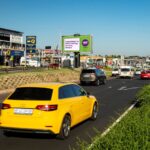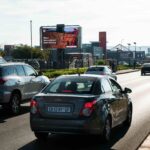 With almost two-thirds of all consumer purchases made within half an hour of being exposed to Out-of-Home advertising, its time to revisit the critical role the medium plays in the broader marketing mix. Roadside Outdoor Audience Data (ROAD) now provides rich data on the consumption and impact of billboards, and integrated with other media stats allows brands to further craft effective, integrated campaigns. OOH should play a key role in this space, argues Howard Lonstein, Marketing Manager for Outdoor Network.
With almost two-thirds of all consumer purchases made within half an hour of being exposed to Out-of-Home advertising, its time to revisit the critical role the medium plays in the broader marketing mix. Roadside Outdoor Audience Data (ROAD) now provides rich data on the consumption and impact of billboards, and integrated with other media stats allows brands to further craft effective, integrated campaigns. OOH should play a key role in this space, argues Howard Lonstein, Marketing Manager for Outdoor Network.
When it’s possible to map the customer journey in intimate detail (turning on the TV over breakfast, passing billboards driving to work, surfing the web during the lunch hour, paging through a magazine at the dentist, listening to the radio on the way to gym), thanks to social listening tools and other data sources, it’s clear that marketing is entering a new era. Knowing where consumers go, what they pay attention to, what they need and where they shop gives us unique insight into how to reach them, and how we can customise messages to engage them in the most relevant way as they go about their day-to-day business. This makes media placement easier – and it also changes our approach to OOH enormously.
Harvard Business Review says the days of treating advertising touch points as if each works in isolation is long past and marketers should ask themselves which combinations of ad exposures work best to influence customers. Think static OOH doesn’t speak to smartphone-clutching millennials? A recent study of 1 837 smartphone users by the Outdoor Advertising Association of America found that OOH media is especially effective at reaching consumers before they search or shop online, while geo-fencing can work seamlessly with out-of-home formats to target consumers in a particular area. The context within which a consumer is exposed to brand communication becomes even more important as the clutter increases. The right message, at the right time, directed at the right consumer results in greater impact and ultimately in action being taken. Marketing Week has predicted that incorporating cellphone connectivity with OOH will become the norm, not a ‘special’ part of a campaign, and it’s hard to disagree. Remember that a customer can be ‘switched on’ at any time during the consumer journey – even stepping out from work to grab a sandwich.
It would be perverse to ignore the role OOH and impact can play in a campaign. It is commonly accepted now that OOH provides great frequency, which is a key driver in priming awareness for campaigns. This is particularly true in terms of digital platforms which reduce the CTP for the overall campaign, providing greater value for advertisers and brands. It is imperative that brands are exposed to these facts and the benefits that are derived when OOH is part of a broad campaign.It is worth noting that the OOH industry in the US recently reported its seventh consecutive year of revenue growth, with a more than 15% increase in 2016 from the previous year, according to The Outdoor Media Association – this reflects a global trend.

Apple expanded its ‘Shot on iPhone 6’ print ad campaign by displaying 162 photos taken by iPhone 6 users (not professional photographers) on giant billboards in 73 cities across 25 countries, along with a 30-second TV ad and videos. Having photos blown up to billboard size gave a good idea of the power of the product without having to spell it out (less is always more on billboards), plus the scale was an ideal showcase for an ‘art gallery’ of images. OOH amplified Apple’s message and achieved enormous reach – the billboards received 6.5 billion media impressions and 255 million online impressions.
Coca-Cola has always loved multichannel marketing. The 23 000-pound ‘drinkable billboard’ it rolled out shot soda through a straw into a drinking fountain, complementing interactive TV commercials and downloadable coupons available from mall kiosks – in this way, it created a brand experience on a large scale, gaining traction via OOH, experiential, digital, social and broadcast channels. It was also vital in terms of increasing social media engagement.
Big brands know the value of high-impact, in-your-face media, but even smaller brands know that OOH delivers. A recent Posterscope US study showed that you can increase reach by as much as 303% if you add billboards to a mobile app and web campaign. Adding OOH to internet ads increases retention by two days, according to research conducted by Brand Science. A billboard can drive online research about a product and lead to online purchases, for example. In South Africa, radio and TV are hugely popular, but younger generations demand a brand experience that talks to them across different channels (and less traditional channels) – something that media planners need to take into account. The Brand Science study shows that ad retention of media one week after seeing an ad is 55% for OOH as against 49% for print and 35% for radio – and 58% of people report consciously looking at OOH ads, which is a higher rate of engagement than other forms of advertising can provide.

Seamlessly integrating OOH into your campaign can help to drive campaign objectives. OOH is a crucial touchpoint because it is so good at engaging with consumers in a way that builds relationships with brands; in fact, when used alongside above-the-line advertising, OOH has been found to play a crucial role in long-term brand-building. By leverage OOH in your campaign, you can reach more people more often, target the consumers most likely to be interested in your brand, drive consumer action, and optimise reach and frequency at a relatively low cost. All this points to a high return on investment, which is a prime consideration in today’s tough market.
- MRF Unveils Latest MAPS® Data - 20th February 2025
- The BRC announces changes to the board and updates for 2025 - 17th December 2024
- Top 50 DSTV TV programmes – October 2024 - 12th November 2024





